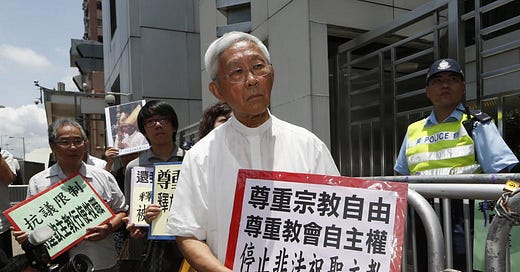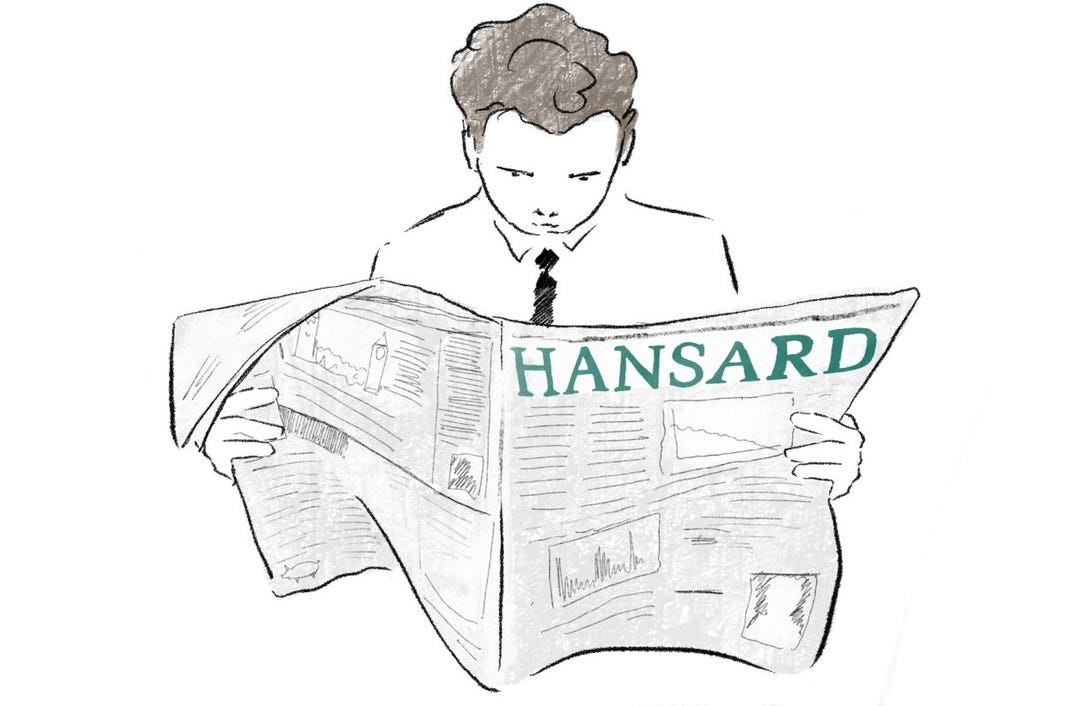Anti-spy Bill introduced, Hikvision, Government intervention over Chinese takeover
A Beijing to Britain briefing
Hello,
On Wednesday evening, news flooded social media that Hong Kong authorities had made more arrests under the wide-ranging and vague National Security Law, including a 90-year-old Cardinal. This sparked a wave of fresh outrage in Westminster as it touched on the big three: freedom of speech, freedom of religion, and freedom of peaceful protest. We take a look at the Government’s response to an emergency debate the following day, who British MPs want to see sanctioned, and what the Chinese Embassy has said.
Elsewhere in SW1, as the dust settles around the Queen’s Speech scrutiny has turned to the Bills the Government wants to pass into law this Parliament. As we briefed readers on Tuesday, the new National Security Bill will be worth keeping a very close eye on indeed. It aims to modernise spying laws and counteract the activities of hostile states on British shores - but notably absent is a much-hyped register for lobbyists working on behalf of other Governments such as China. Our sources tell us this is due to civil service disagreement around how broad the scope could be, while the Guardian hears an amendment pushed by the Government in the near future will cover this aspect.
In the City, Hikvision is reeling after another bruising week. No fewer than five articles have scrutinised the company’s connections to Xinjiang or use across the UK. The firm tells reporters it is “engaging with governments globally to clarify misunderstandings about the company, our business, and address their concerns”, but per their last communication, is refusing to meet the UK’s governing official on surveillance unless it’s private meeting. Separately, we read with interest the apparent planned merger between Vodafone and Three UK, and wonder if the latter’s Hong Kong ownership could draw political heat. Elsewhere, the world’s biggest private metals trader has backed a British start-up’s mission to build a lithium refinery. This has been painted by some corners of Fleet Street as a chance to break free of China’s grip on the lithium supply chain, but much more investment will be needed before this comes close to being a reality.
Welcome to ‘Beijing to Britain’ - a weekly overview of the ebbs and flows of the discussion in Westminster and the City around the UK’s relationship with China, and how it impacts politics, the private sector and society.
Government bodies and businesses - to learn more about our corporate offer, get in touch.
A quick look at how China is being discussed in Parliament
27 mentions of China/Chinese, 1 mention of Xi Jinping, 24 mentions of Hong Kong, 3 mention of CCP, no mention of Taiwan, no mention of Tibet, no mentions of Xinjiang
589 out of 650 MPs (90.6%) have a Twitter account.
13 MPs’ tweets containing the term ‘China/Chinese’, 8 on ‘Hong Kong’, 0 on ‘Tibet’, 0 on ‘Taiwan’
Order! Order!
Some of the more eye-catching questions and tweets from Westminster dwellers this week
Barry Sheerman (Labour) tweeted “What is wrong with the moral compass of China & Eritrea? @BBCNews.”
Richard Graham (Conservative, Chair of China APPG) tweeted “New Chief Exec of Hong Kong SAR, John Lee, the only candidate, was rubber stamped by 1,416 residents selected by a Cttee of 7, chaired by..John Lee. Far from making progress on Article 45 HK Basic Law (selection ‘by universal suffrage’) this is a great leap backwards”
Politics
Spy Bill, Hong Kong arrests, Wallace on China
Spy Bill gets a reading
What’s in the new National Security Bill?
On Wednesday, Home Secretary Priti Patel introduced the new National Security Bill (NSB) in the Commons. Although she didn’t mention China in her speech, an accompanying article in the Telegraph penned by
her Special AdvisersPatel made reference to “political interference activities on behalf of the Chinese Communist Party” as necessitating this new Bill. After all, the NSB has been touted by the Government and intelligence community as the “biggest overhaul of state threats legislation for a generation.”In an accompanying press release, MI5 Director General Ken McCallum said:
“The UK is in a contest with states who are trying to undermine our national security and democratic institutions. Laws designed to deal with wartime espionage have not kept pace with the threats MI5 is now tackling. State actors are stealing not only national security secrets, but our cutting-edge science, research and technology.
They are attempting to interfere covertly with our democracy, economy and society. We see coercion and, at the extreme, direct threats to life. The laws of the past continue to serve us against ‘traditional’ espionage. It must be right that Parliament looks at modernising the powers the State has to protect us all from the full range of today’s threats.”
The NSB’s remit has a number of proposed measures, such as the reform existing espionage laws , introduction of new offences to tackle state-backed sabotage, foreign interference, the theft of trade secrets and assisting a foreign intelligence service (e.g. by being a covert foreign spy), and the creation of a foreign influence registration scheme (FIRS). If you want to read the technical documents that come with it, they’re here.
However, it’s what’s not in the Bill at this stage that should be drawing attention. As we had discussed previously, the Government was being iffy around including a provision that would require lobbyists, PR firms and other professionals in the UK to register their work for China or any other foreign countries. Despite communications pledging it would be included, it is not, although the Guardian reports that we may well see a Government amendment in the coming weeks that deals with this issue. The hold-up appears to be around what activities would have to be registered, and how wide a net the Government wants to cast.
For example, consider the following. Would a London-based strategic advisory firm run by a former Foreign Office mandarin have to register if it was advising, not lobbying, on behalf of a Chinese company with links to the CCP, but not state-owned?
Hong Kong arrests
Calls for sanctions
On Wednesday evening, Hong Kong authorities arrested Cardinal Joseph Zen, the 90-year-old former bishop of Hong Kong and one of the most senior Catholic clerics in Asia, and other prominent figures involved in the 612 Humanitarian Relief Fund which provided legal aid to people who took part in 2019 pro-democracy protests. The move sparked outrage across the world, and on Thursday morning IPAC co-chair Iain Duncan Smith was granted an Urgent Question.
Labelling the arrests “a huge abuse of human rights,” IDS criticised his party’s lagging approach to rolling out sanctions against Chinese and Hong Kong officials. Standing in the chamber, he read out a list of those sanctioned by the USA and called for the Government to “step up and make it very clear” by doing the same. His requests for sanctions included:







